
How to Say Thank You in 12 Languages Eton Institute Words in different languages, How to say
9. Bij voorbaat dank: thank you in advance. Hang in there as we knock it up a gear. Here's how to say "thank you in advance" in Dutch: "bij voorbaat dank".But not: this is really only used in emails. Next time you're writing an email in Dutch to someone higher up in rank, you can use "bij voorbaat dank" to end it off — and then proudly take a big bite out of that well.

Dank Je Wel Thank You In Dutch Type Lettering Card Stock Vector Image 53493748
Saying Thank You in Dutch. When it comes to saying thank you in Dutch, the most common phrase you'll come across is "dank je wel." This phrase is used in informal situations, such as when you want to thank a friend or a family member. It can also be shortened to "dank je" or "dank." Another commonly used phrase is "bedankt."

How to Say Thank You in Dutch Language
The most common way to say thank you in Dutch In the tapestry of Dutch communication, "Dank Je Wel" is more than a phrase; it's a cultural emblem of appreciation and goodwill. Uttering these words transcends a mere exchange of pleasantries; it signifies a genuine acknowledgment of someone's actions or words..
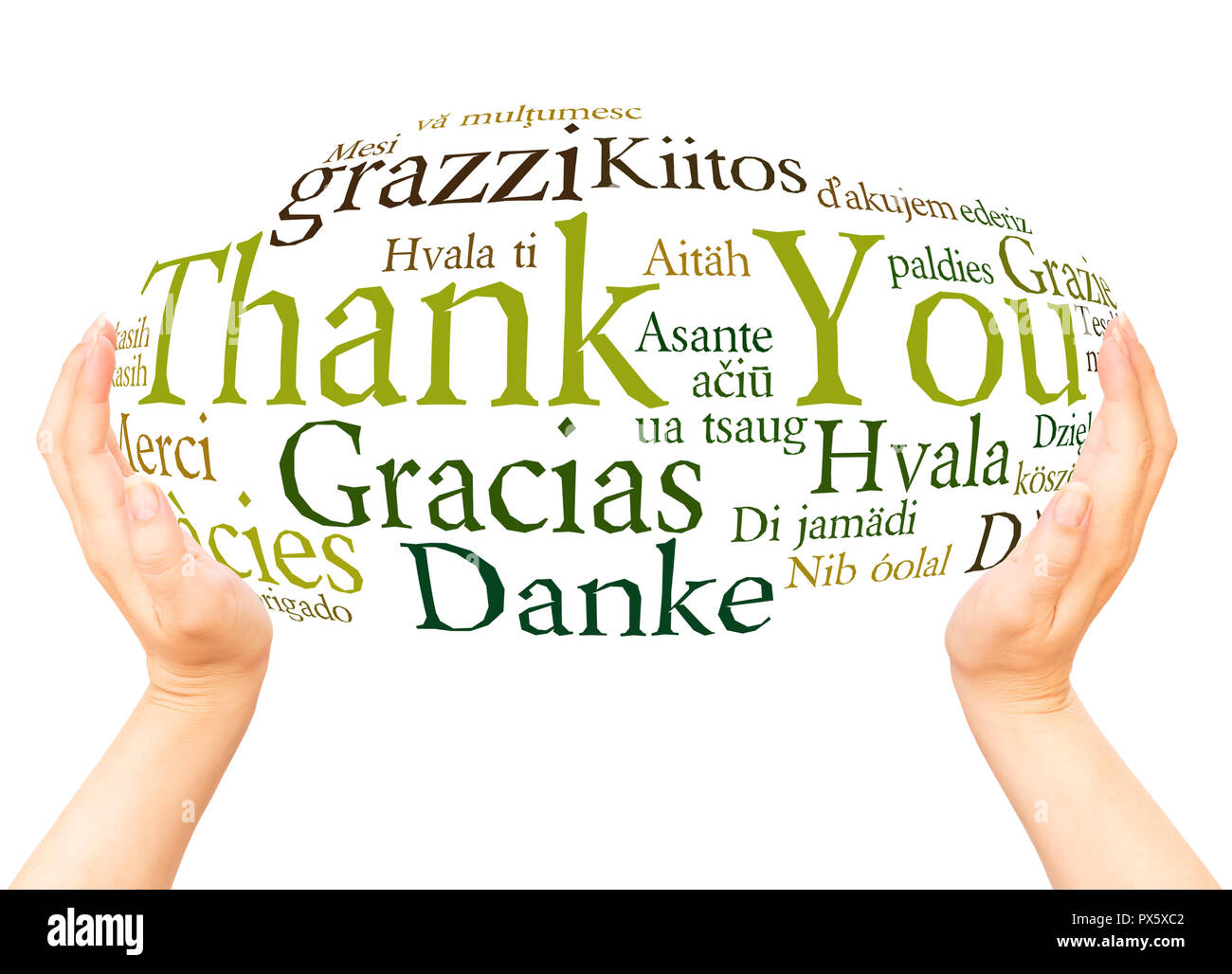
Know How To Say Thank You In Different Languages Than vrogue.co
Discover the essential Dutch phrases for saying thank you and learn about the cultural etiquette surrounding expressions of gratitude in the Netherlands. Basic Phrases Dank je wel.. Another way to say thank you in Dutch is by using the word "Bedankt." This phrase is similar to "Dank je wel" in meaning and is also considered informal.

Saying "Please" and "Thank You" in Dutch Is a Little Complicated Please and thank you, Say
How to Say an Informal "Thank You" in Dutch. 1. "Thank you" in Dutch - Dankjewel. 2. "Thank u" in Dutch - Dankje. 3. "Thank you very much" in Dutch - Echt heel erg bedankt. 4. "Super thanks" in Dutch - Superbedankt.

16 Ways to Say Thank You in Dutch • HollandDreams
Here is how to say "Thank you" in Dutch: Informal Ways to Say Thank You. Dankjewel or Dankje. This is the most common and straightforward way to say "thank you" in Dutch. It is similar to the English phrase "thank you". Use it in casual settings with friends, family, or acquaintances to express gratitude for everyday gestures.

Thank You Dutch White Hand lettering handmade Vector Image
Here are the formal ways to say thank you in Dutch. #1 Dank u wel. The most common formal expression is dank u wel, which can be shortened to dank u. Both translate to Thank you. #2 Dank u zeer. The Dutch word zeer translates to very, highly, or greatly. As such, dank u zeer translates to Thank you very much. #3 Hartelijk dank
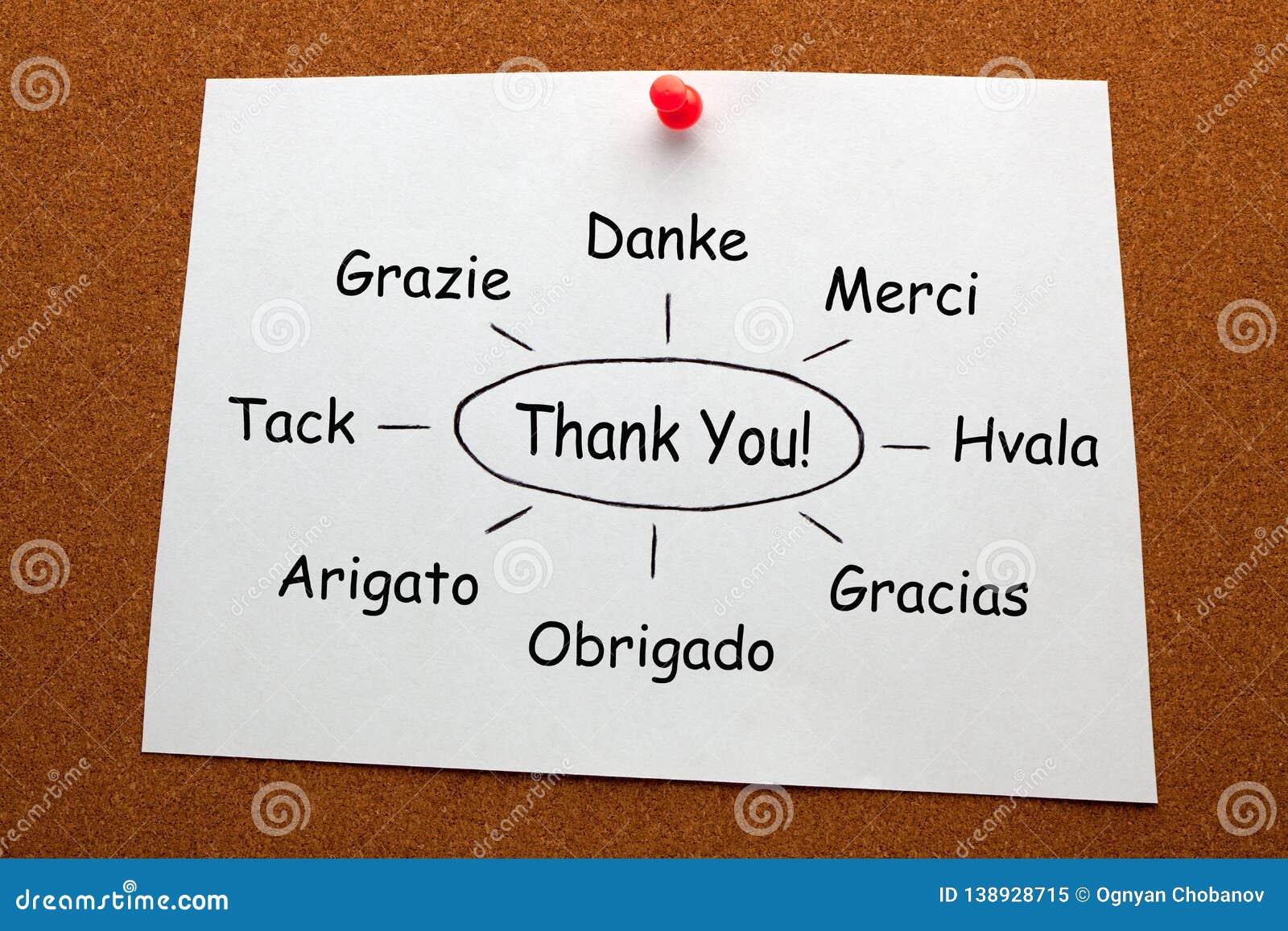
Thank You In Different Languages Typed By Retro Typewriter RoyaltyFree Stock Photography
1. Thank You. Dank je wel. It is a quick way to say thank you in Dutch. You can use it anytime, from the concierge helping you with your hotel room to the barista who makes your coffee to someone who holds a door open for you. Although, most Dutch people will remove the suffix - wel and say dank je.
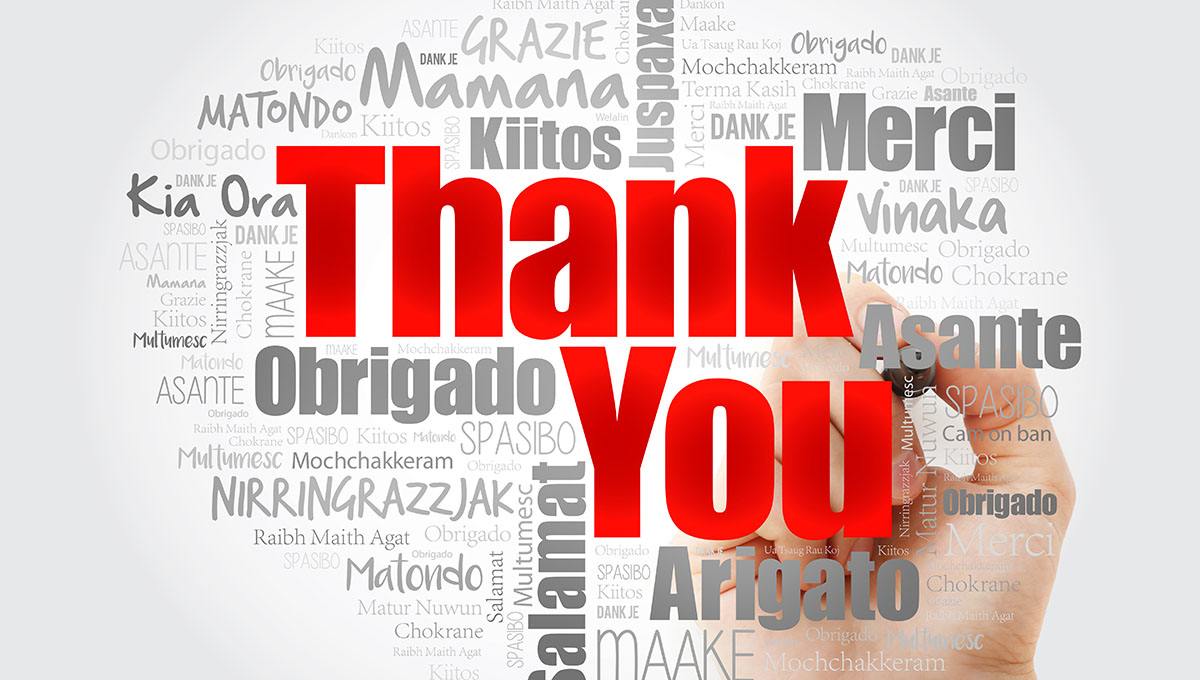
How to Say Thank You in Different Languages The Table
An all-purpose expression of thanks is dank je, which translated directly as "thank you," at a neutral level of politeness. It's not impolite, but not formal either, and is the most widely used Dutch phrase by far. Dank is pronounced as written, but je sounds like "ya." The formal expression dank u is best reserved for seniors; Dutch society.
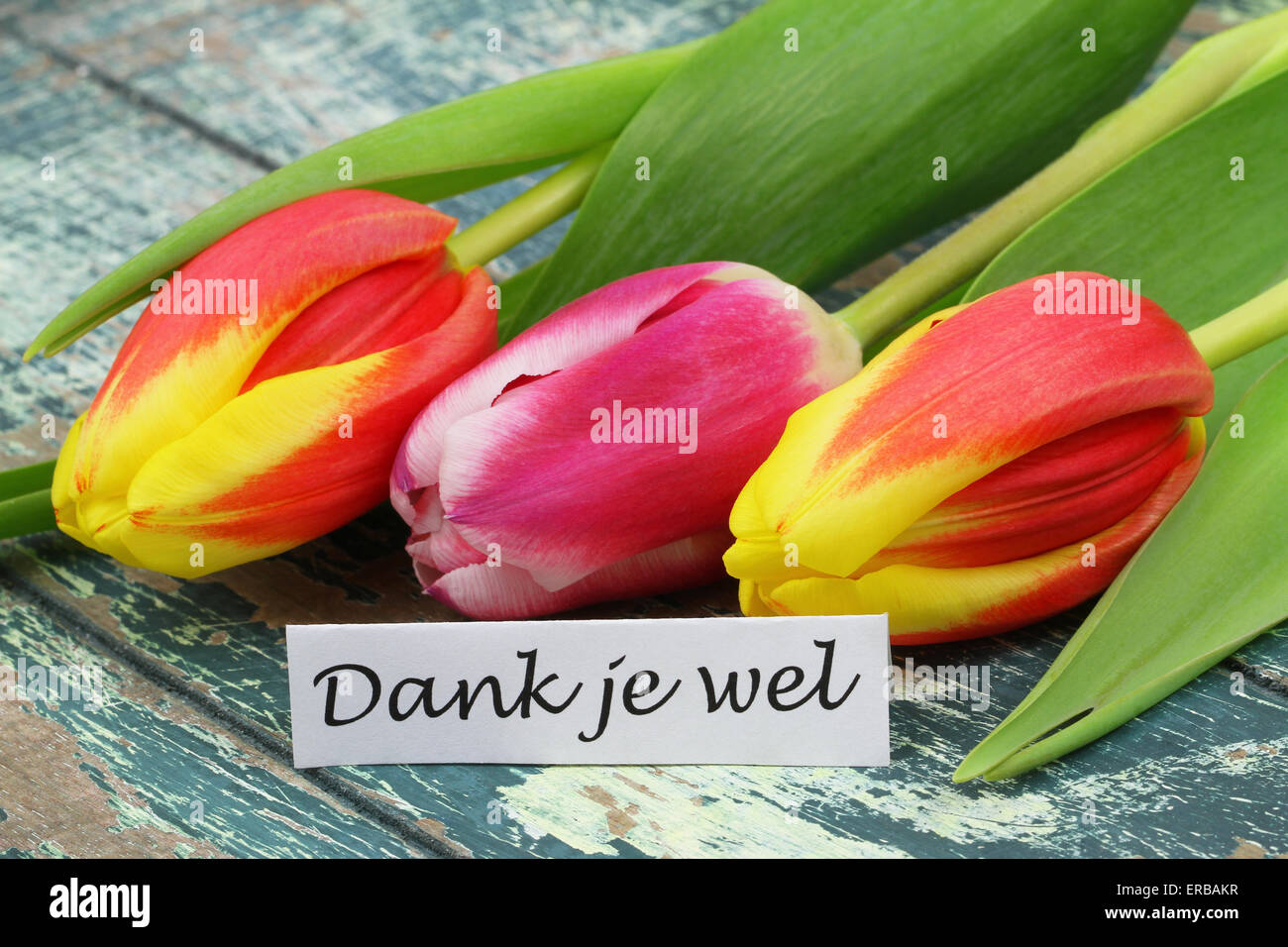
Dank je wel (which means thank you in Dutch) card with colorful tulips Stock Photo Alamy
As we conclude, let's recap the key takeaways and encourage you to embark on a journey of meaningful connections through the art of saying "thank you" in Dutch. A. Recap of Key Dutch Thank You Phrases and Pronunciation: "Dank je wel" for informal settings, pronounced as "dahnk ye vell." "Dank u wel" for formal occasions, pronounced as "dahnk oo.
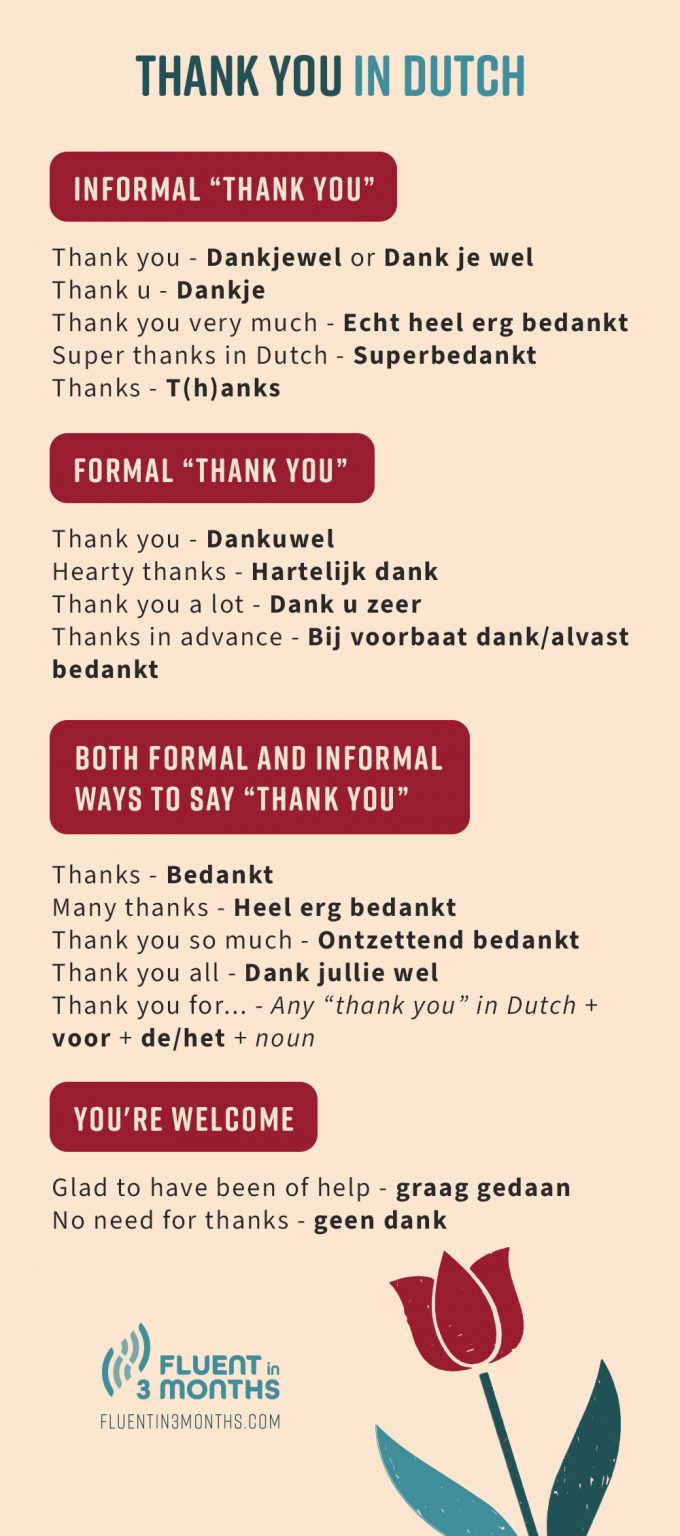
14 Ways To Say “Thank You” in Dutch (+ 2 Ways to Reply) Gud Learn
And in this respect, the Netherlands is no different. 1- Dank u wel. In Dutch, "Thank you" is Dank u wel. 2- Dank u wel voor alles. Another useful phrase would be Dank u wel voor alles, which means, "Thank you for everything.". The component voor means "for" and Alles means, "everything.".

How to Say Thank You in Different Languages Submit Infographics
The informal way to say thank you in Dutch is by using the term "dank je wel.". This is the most frequently used way to utter thanks. REMEMBER: The j in Dutch is pronounced more like a "y" sound. And the w is pronounced as a "v" sound! Therefore, to correctly pronounce dank je wel, you would say "dahnk-yuh-vell.
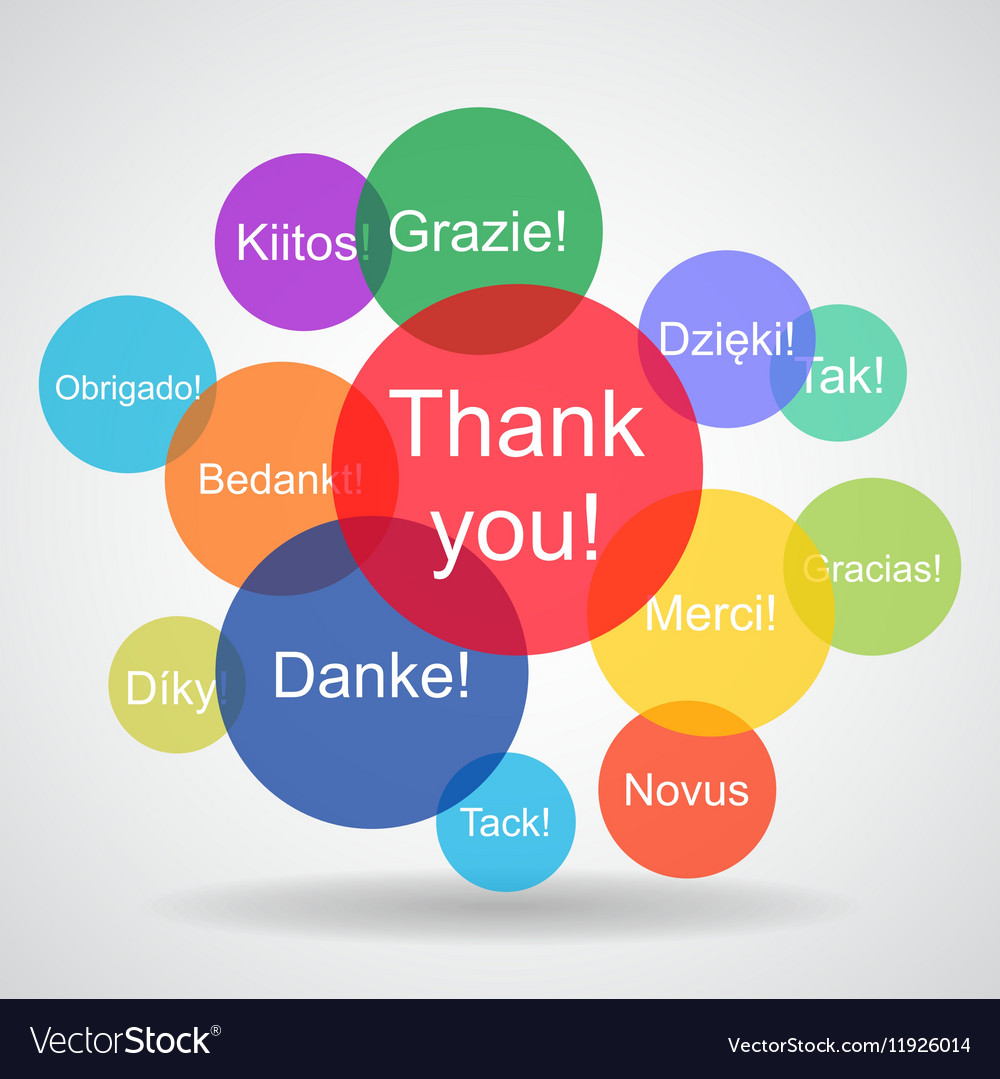
Thank you messages in different languages Vector Image
So if you want to give thanks in Dutch, just say "dank u" or "dank u wel" or you can try any of the following phrases below. Thank you: Dank u. Thank you: Dank u wel (dank oo vel). Thank you: Dankjewel (dank ya vel). Thank you: Dank je wel (dank ya vel). Thanks: Bedankt (beh-dankt)
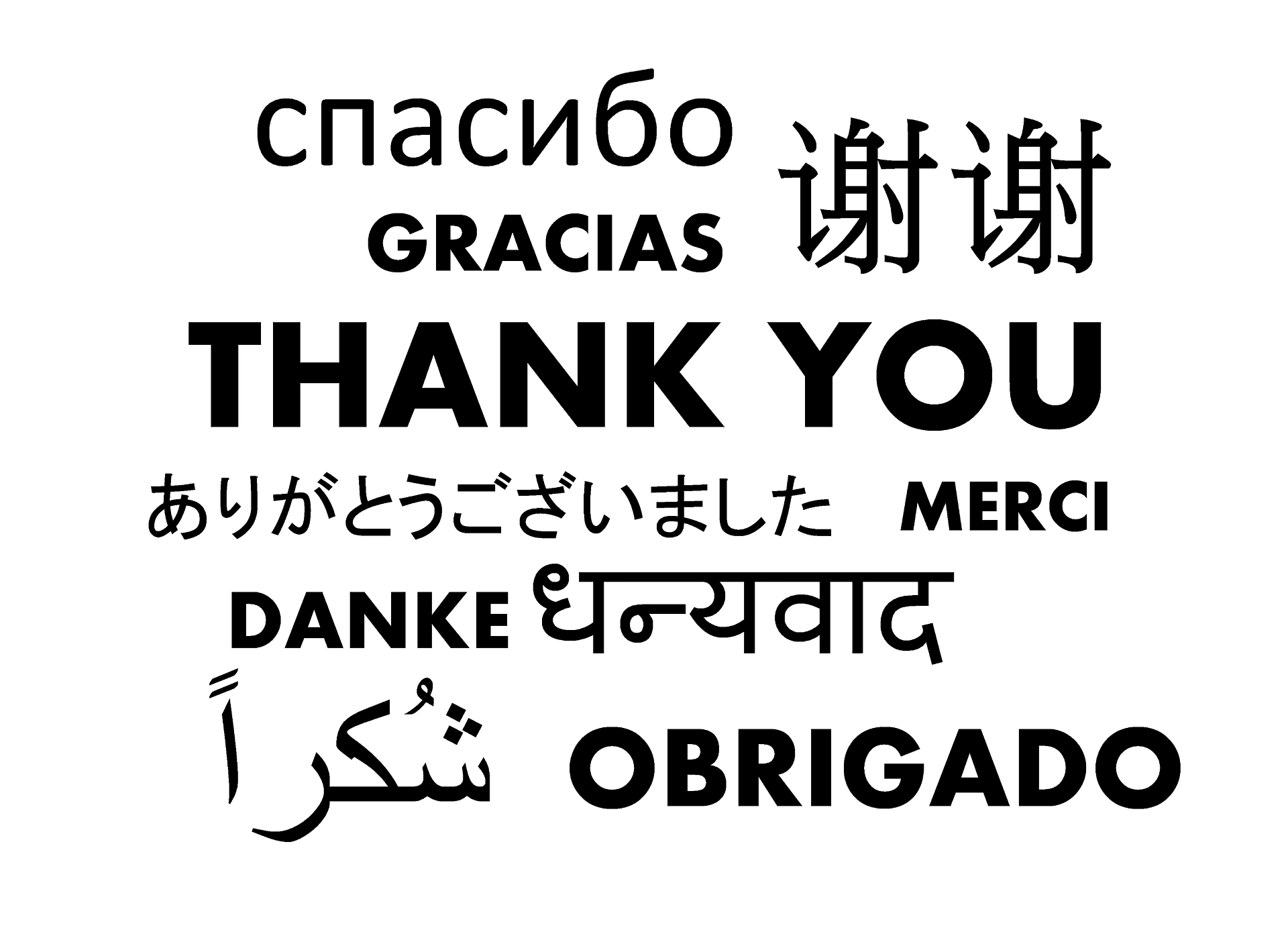
Learn How to say "Thank You" in 55 different languages ⋆ Life Is For Travel
10 ways to say thanks in DutchWant to express your gratitude? Here are ten ways to say thank you in Dutch!Want to learn Dutch in Dutch with my online courses.

Learn Dutch How to say Good morning Thank you in Dutch? YouTube
Dank je wel (Thank you) Dank U wel (Thank you) If you want to give someone a thoughtful thanks because someone has been very kind and, or helpful, you can say Hartelijk bedankt.The translation of this would be 'A heartfelt thanks'.For example, if you get lost in Amsterdam and a kind stranger helps you find your way and even calls a cab for you, you may want to give them a heartfelt thanks.

ELD for You and Me Thank You in Different Languages
For example, if you're offered a free sample, and you say dank je wel (thank you), the Dutch person will assume you mean no thank you; you don't want any even if you do. Be sure to add ja (yes) BEFORE you say dank je wel (thank you) to imply that you would like some! Thank Like A Young Person. A dead giveaway that you're a non-native.
- Parc National De Jacques Cartier
- De 7 Eigenschappen Van Effectief Leiderschap
- Saffraan Komt Van Welke Bloem
- Is Meldcode Hetzelfde Als Tenaamstellingscode
- El Mundo De Las Tapas
- Laptop Sleeve 13 Inch Macbook Air
- De Ridders Van De Lange Tafel
- Hotel Le Touquet Paris Plage
- Zonder Visserij Geen Gezonde Zee
- Hoe Ziet Pippi Langkous Er Nu Uit